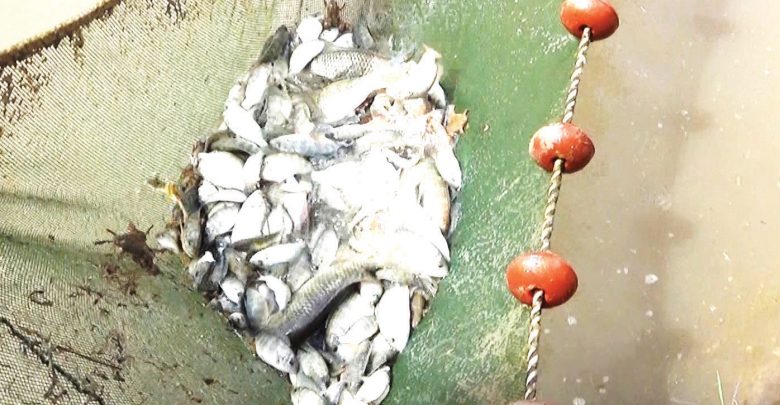Africa-Press – Zambia. The water in the pond is relatively calm, with only dull surges gently swaying the shadow of Botham Harawa sitting despondently on one edge of the pool.
The 32-year-old, from Chamono Village, Traditional Authority Mwalweni in Rumphi District, spends a larger part of his time at the fishpond half a kilometre from his house downstream.
“I am worried,” he says wearily. His four ponds are his lifeline, but now an unfamiliar predator is lurking nearby.
“I keep on observing the ponds to see if fish is floating. A deadly disease has been detected nearby,” Harawa says.
Not seeing the fish floating on the calm waters does not ultimately allay his fears. The aquatic limbless creatures may still live with wounds and be rejected by consumers upon harvesting.
“It means the whole process of feeding and harvesting it becomes useless,” the fish farmer says. Harawa makes not less than K600,000 every six months after selling the domesticated catch at an average of 300 Kilogrammes (Kg) at K2,000 per Kg.
His fishponds are within Ntchenachena Extension Planning Area which is suspected to be under attack by a fish disease called Epizootic Ulcerative Syndrome (EUS).
Several fishponds in the area depend on water from Lunyina and Rukuru South Rivers which are reportedly harbouring the infectious disease that attacks both wild and farmed freshwater fish.
Experts are still assessing the status of the disease but the Food and Agriculture Organisation (Fao) of the United Nations says some outbreaks of EUS are associated with heavy rainfall and flood events, drops in temperature and low alkalinity and salinity, among others.
“EUS is one of the most serious aquatic diseases affecting finfish. It causes high losses to fish farmers and fishermen through mortalities, market rejection and public health concerns due to the presence of ugly lesions and reduced productivity of all susceptible fish species,” Fao says.
The UN agency adds that other indirect long-term effects include the threat to the environment and aquatic biodiversity through, for example, declining fish biomass and causing irreversible ecological damage.
The disease is said to have the potential to financially decimate those who rely on fish for income such as Harawa who is already suffering from panic spurts.
“In addition, and perhaps more importantly, EUS outbreaks threaten food security for subsistence fishers and fish-farmers and subsequently people’s physical health, as fish are an important source of animal protein,” Fao states.
Harawa, who took over the fishponds from his farmer in 2014, is clueless about how to deal with the problem. He takes care of his aged father, pays school fees for his children and others and provides basic needs for his extended family using proceeds from the venture which has survived several climates.
His story is similar to that of Spiwe Gondwe, another fish farmer from the same location, whose efforts are being set back by the disease. Gondwe is worried that people’s departure from traditional crops that they used to grow is being threatened by the fish disease which may push them back to what they had abandoned due to diminishing output.
“We are very serious when it comes to fish farming but the disease is threatening our efforts. After we realised other crops were no longer profitable, we started fish farming.
“We appeal to extension workers to help us contain the pandemic. We don’t see him here for action and we are worried,” Gondwe says.
Rumphi District Fisheries Officer Edward Mkandawa agrees with Harawa and Gondwe, saying the disease deserves serious interventions to contain its further spread.
Mkandawa says Rumphi District and Ntchenachena, in particular, has the potential to do well in fish farming because the area has plenty of water that freely flows down from Nyika Plateau.
“It is our duty to be visiting these farmers and share with them how best to contain the disease. Otherwise, the it poses a big threat to farmers’ efforts.
“The problem is that we are limited in numbers and we cannot reach all the affected farmers because they are many,” Mkandawa says. Department of Fisheries Senior Deputy Director Geoffrey Kanyerere Gondwe confirmed the disease’s outbreak in Mchinji.
For Rumphi, he says after inspecting some ponds, samples were sent to the University of Zambia to verify if the disease is indeed there in the Northern Region district.
“It is true that we suspect some fish in South Rukuru River might be infected with EUS but we are waiting for verification. Now, we are saying people should not consume such fish because they are hazardous to health,” Gondwe cautions.
He implores fish farmers that detect something suspicious in their catches to report to fisheries officers who can advise on how best to contain the disease. According to Gondwe, the disease originated from the Democratic Republic of Congo through Zambia and was first spotted in Mchinji in Malawi.
Meanwhile, an economics expert from the Malawi University of Business and Applied Sciences, Betchani Tchereni, has warned that the disease may frustrate government’s efforts in encouraging farmers to diversify agriculture production.
Tchereni further sees the outbreak as a huge threat to food security and human health. “It may later affect our economy as hospitals will need more drugs and other supplies to treat people who have consumed the diseased fish,” the economist says.
Principal Fisheries Officer, Hestings Zidana, says the Department of Fisheries is conducting sensitisation campaigns through which it is warning farmers against certain practices including exchanging fish nets and sharing fingerlings.
“Our team goes to the areas suspected to have fish that has the disease where they conduct assessments and ensure farmers are assisted.
“Ponds with infected fish are treated with lime because it kills the disease and improves water quality,” Zidana says. The Department of Fisheries singles out fingerlings as being at high risk of getting infected with EUS albeit indicating all species are vulnerable.
But, for fish farmers such as Harawa, the dark cloud hovering over their ponds— which they fear might be multiplying a dangerous disease—is heightening the anxiety. At least, knowing the truth about their situation may help them in containing the scourge, they say.







